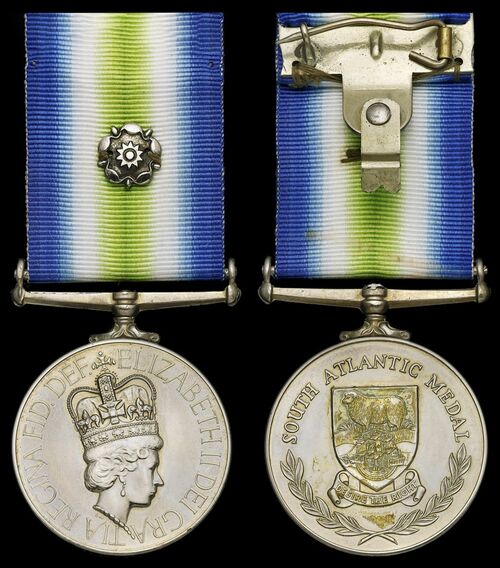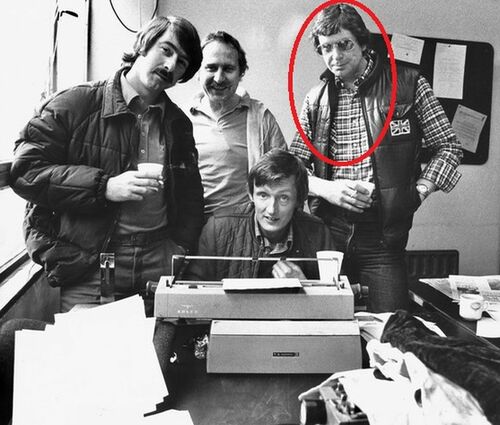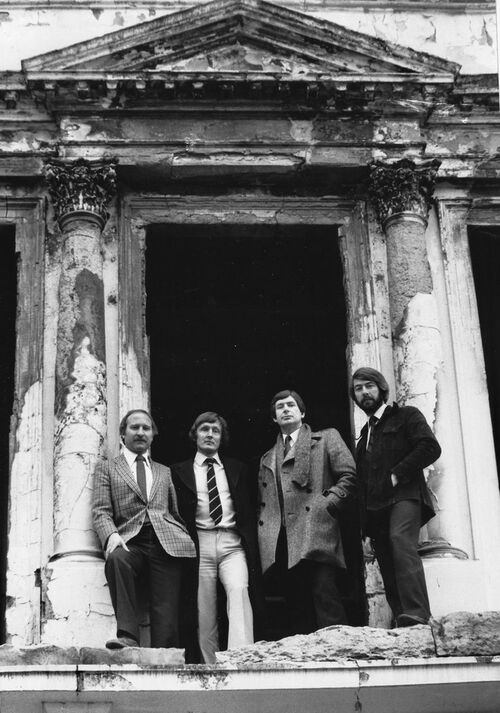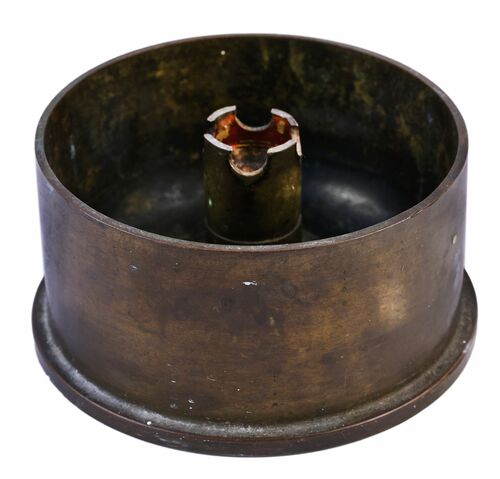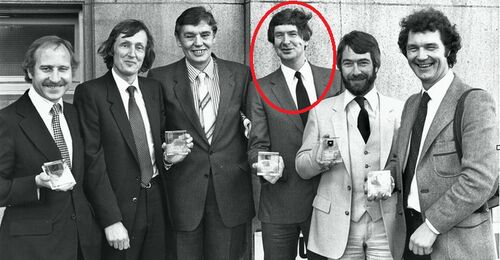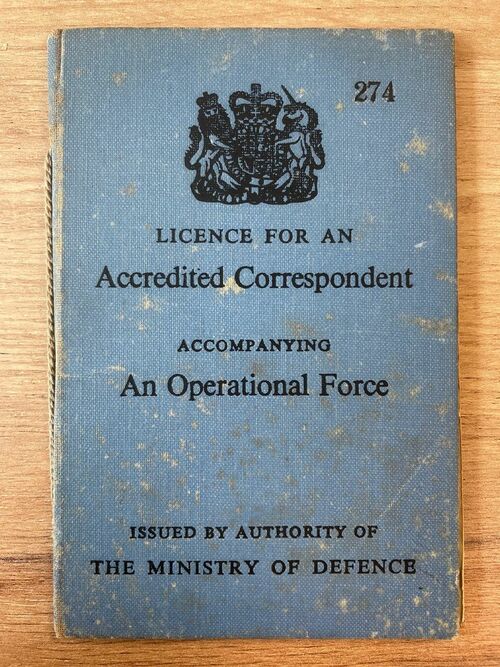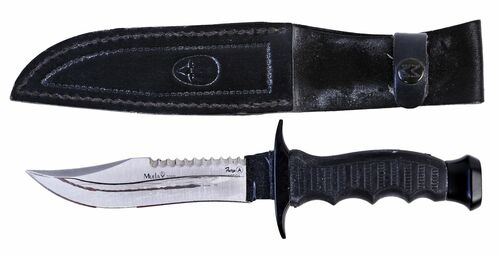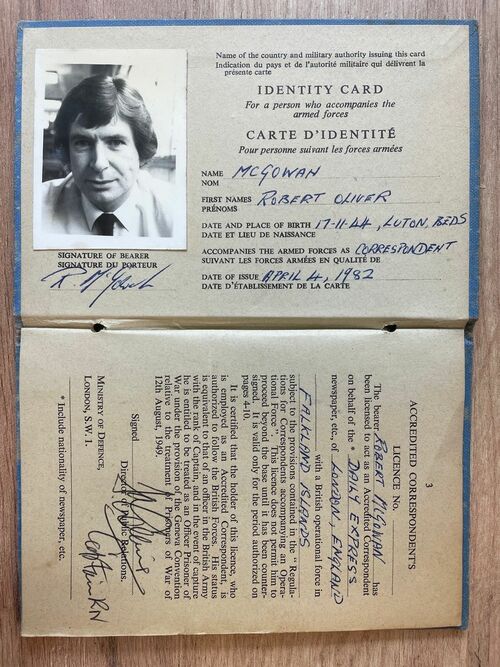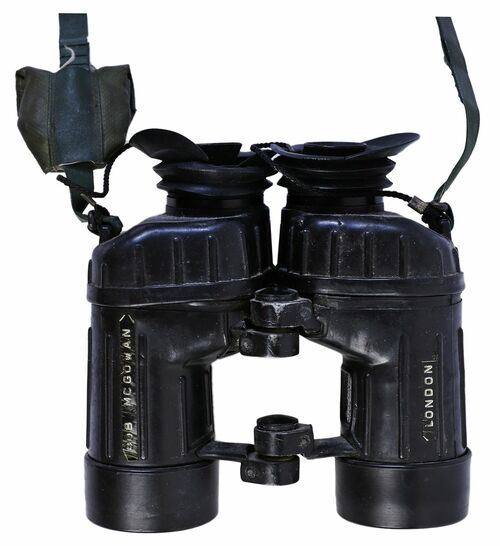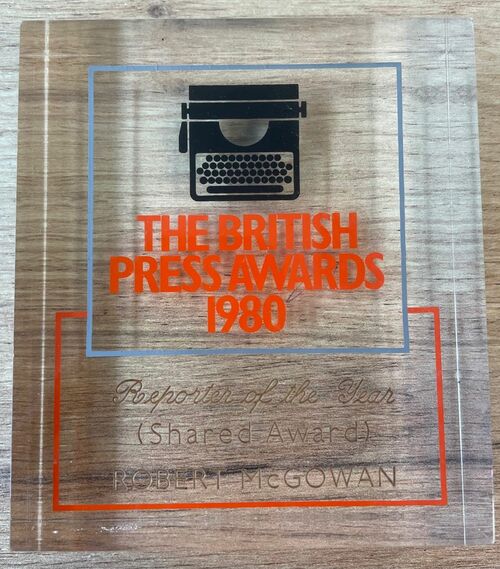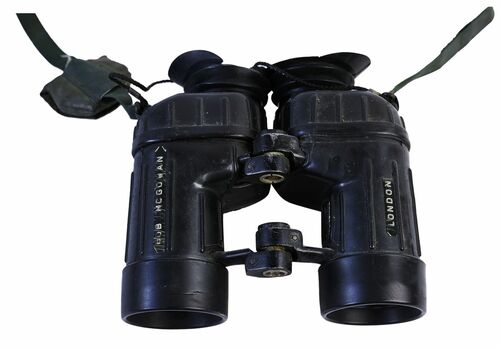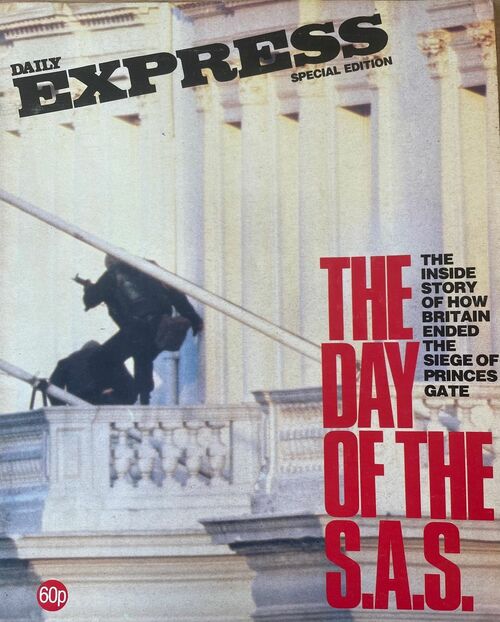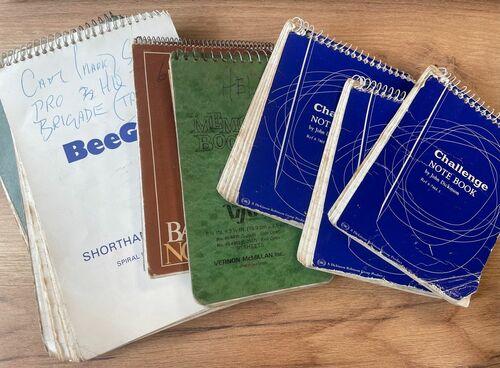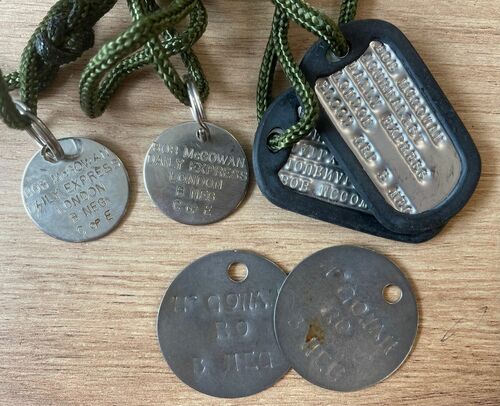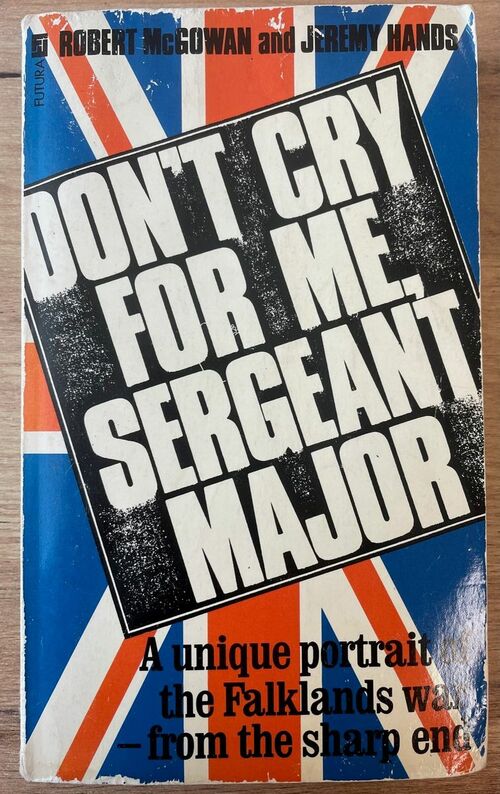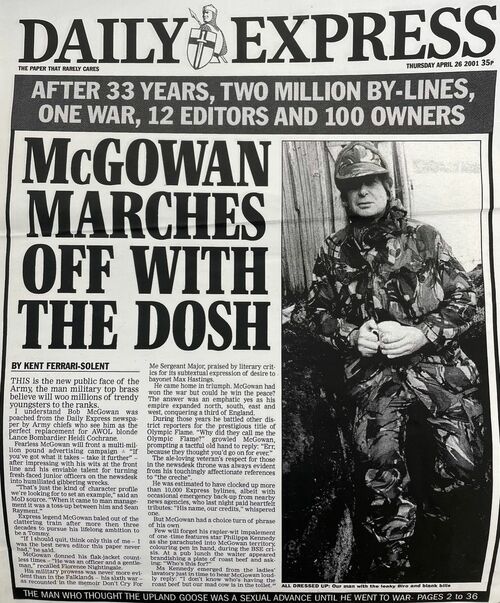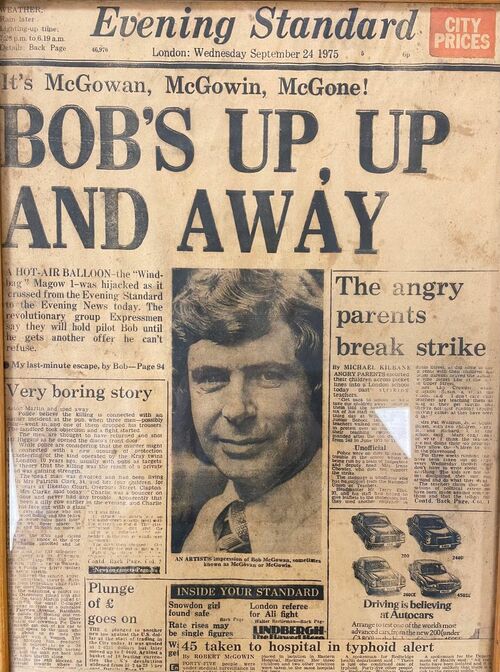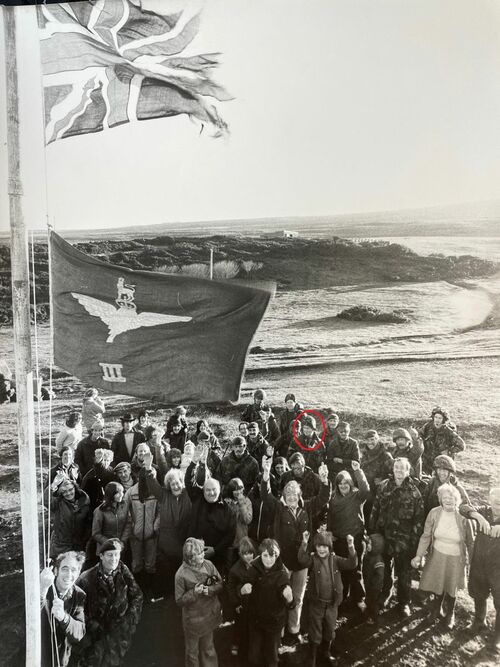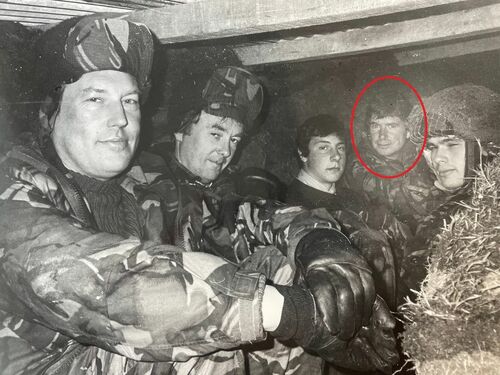Auction: 23002 - Orders, Decorations and Medals
Lot: 164
Sold by Order of the Recipient's Widow
'My old colleague the late great Bob McGowan of the Daily Express won Reporter of the Year for his coverage of the siege. A great hack who yomped with 3 Para in the Falklands and was awarded the South Atlantic Medal with Rosette. Bob never shirked the front line.'
So wrote a colleague after his passing.
The rare South Atlantic Medal awarded to R. McGowan, Press Reporter for the Daily Express during the Falklands War; he was attached to the 3rd Battalion, Parachute Regiment (3 PARA) throughout the conflict and shared in the Battle of Mount Longdon, his experiences led to his publishing Don't Cry for Me, Sergeant-Major
McGowan had already forged a fine name for himself as a conflict correspondent, further adding to his laurels in leading the reporting of the Iranian Embassy Siege and subsequent storming (Operation Nimrod); he had spotted SAS operators drinking in a local pub a day or two before the action and instinctively realised the plans that were afoot - in exchange for his cooperation in keeping the plans under wraps he was rewarded with the scoop that earned his team the Reporter of the Year Award
South Atlantic 1982, with rosette (R McGowan Reporter Daily Express), mounted as worn, good very fine
A good biography of Robert McGowan is offered by his widow, who shines a light on various important aspects of his remarkable career:
'Bob McGowan was born on 17 November 1944. The Daily Express splash that day read, Six Allied Armies Go Into Action. Perhaps an omen. He went on to cover six wars, including the Falklands War.
Bob began his career in Grimsby working for a local news agency. It was good training as he was soon accepted to cover holiday relief on the London Evening Standard in 1968. The Standard was then a paid-for paper with seven editions and two replates. His first skirmish away from London was to report on the Troubles in Northern Ireland. It was the beginning of a string of foreign stories which included hijackings.
Reporting from Northern Ireland, Bob found the occasional clicking during his phone-calls both annoying and invasive. He was being bugged. Unexpected parcels delivered to his home were thus viewed with suspicion. A belated birthday present for his daughter with an Irish post-mark was placed in the garden waiting for it to explode until his young daughter grew impatient and demanded that it was for her and not for him. It was a harmless toy. He would often check under the car, particularly after moving from London to Sussex having received an unwanted Christmas card from the IRA.
Filing your story to the newsdesk to beat the opposition in the seventies was a challenge. There were no mobile phones so ingenuity was key. Local residents were sometimes persuaded to lend their land-lines or handsets were removed from phone boxes and stowed in pockets ready for the sending over of copy. On one occasion Bob and a Daily Telegraph reporter risked arrest by breaking into a telex office in Romania during an earthquake.
In September 1975 Bob was about to join the Evening News, the rival London evening paper, when Alastair Burnet, the then Daily Express editor, ignored the Beaverbrook 'no-poaching' rule and suggested Bob join the Express instead. His dream had come true. It had been his ambition to work for the Express more than any other newspaper in Fleet Street.
Soon he was in the thick of it, covering wars, sieges, hijacks; the more dangerous the more he wanted to report on it. In the Moluccan siege in Holland, he asked the Daily Express back-bench to hold the front page for an exclusive. His instincts were that all hell was about to break loose. He was right. They held the page and at 4am, it all kicked off.
When the Russians invaded Afghanistan, Bob and award-winning photographer Steve Wood were the first journalists to cross the border and were arrested by the Russians. On release Steve asked the Russian tank driver to move back a bit so he could go to F4.
In the Ugandan war, the country under Idi Amin, Bob witnessed such appalling inhumane acts of depravity that the images lived with him forever.
In 1980 Bob headed a team to cover the Iranian Embassy Siege. They ran a 24-hour shift and in one of Bob's off moments in the local hostelry, he spotted a couple of unlikely souls slowly sipping their pints. He twigged straight away; they were SAS. Promising emphatically not to reveal their presence they gave him the opportunity to get a beat on the rival papers and TV media. Afterwards, their detailed booklet was instrumental in the team winning Reporter of the Year Award (shared).
In 1985 he covered the Malta hijacking when an EgyptAir Boeing 737 was taken, culminating in the massacre of 62 people.
Some stories he accepted under duress. One such story, mocked somewhat on Granada TV's What the Papers Say who pointed out, under a wry smile, that there couldn't have been much of a queue to cover the Crop Circle/UFO story. The Daily Express ran a middle-spread on said crop circle for a whole week. An increase of alcohol helped him through that one.
Other stories were welcomed enthusiastically. In 1985 Bob worked in the New York office. He was lucky enough to be in Central Park when Simon and Garfunkel reunited unexpectedly to give an unforgettable concert. He was in Rio when Ronnie Biggs was nicked by Skipper of the yard, and years after the Profumo affair he had lunch with and interviewed Mandy Rice Davis. There are too many stories in thirty-three years to detail, for example when he shamed a prominent Insurance group into compensating an elderly widow who was one day late in her renewal after the great hurricane of 1987.
However, it was a Saturday morning in March 1980 whilst drinking his umpteenth cup of black coffee when Bob read that Argentinian scrap merchants had landed illegally in South Georgia. He instantly began pressing both the Daily Express and, particularly, the MoD for accreditation to go to the Falklands. A war, he was convinced, was an inevitability.
A firm no, initially, was the response from the MoD. Concerns were expressed about the conflict being covered in as much detail as the Vietnam War. No more TV wars. The MoD relented and gave accreditation but umbrellaed extreme difficulties for the reporters in filing their stories for publication, so much so that there was an enquiry afterwards at which Bob gave evidence.
Bob's departure to the Falkland Islands was a day after the major contingent had been waved off quayside. On the 6 April, 1982, he sailed aboard RFA Sir Lancelot, of the Round Table Class. He transferred alongside everyone else plus logistics at Ascension Island mid-Atlantic. Now on the Canberra, Jeremy Hands of ITN noticed Bob making copious notes. 'You're going to write a book, aren't you?' he asked Bob. He persuaded Bob to join forces. Jeremy was embedded with the Marines, Bob was embedded with 3 Para. It made sense.
Bob's idea was to write a different kind of war book, one that told the story from the soldier's point of view rather than a historical account. It was a great success and for a paperback did remarkably well, in fact second-hand copies are still being bought and reviewed on Amazon forty years on. Originally entitled by Bob, Sick as a Penguin, it was finally published under the name, Don't Cry for Me Sergeant Major, at Jeremy's suggestion.
During the voyage from Ascension to the Falklands the young soldiers, only a few years older than his son, would ask the question, 'What's it like in a fire-fight?' Bob found these questions difficult to answer. Covering a British war profoundly affected him more than any other conflict. The South Atlantic Medal Association claimed years later than more soldiers died through suicide after the Falklands than in the battle itself. Bob wrote this story but sadly no-one seemed that interested.
A follow-up book, Try Not to Laugh Sergeant Major was written in the same vein about the British soldier in peacetime in Germany, on the flanks of the then NATO border with Russia. Bob took time out to visit Belsen Buchenwald. Ever the observer, he noticed how birds would detour around the camp and how there were no wild flowers growing.
He'd been with the Express for over 30 years when he received a request to attend a ceremony in order to mark that event. Coupled with the invitation was a voucher for Harrods (which he gave to his wife) and a catalogue for him to choose a Dartington decanter which would bear the inscription referencing his service with Beaverbrook Newspapers.
He smelt a rat. He'd noticed that more and more of the old stalwarts were being put out to pasture for one reason or another, mainly because they were on annual contracts. He decided to ignore the frequent chivying to pick up that damn decanter which is cluttering up the Boardroom, figuring that once he did so he'd also be collecting his P45. And so it continued. When are you coming? Not just yet.
But he was outwitted. The Dartington was despatched. Shortly after that he was offered redundancy which he took at the young age of 56. His comments are best left unprinted.
When Bob left the Evening Standard and the Daily Express he was given a mock-up front page of each paper. He worked as a freelance for a while covering the Sarah Payne trial, but finally decided that journalism wasn't the same anymore. He was never a fan of cheque-book journalism and even less of Showbiz stories. He retired with his wife to Spain, touring occasionally. Nine years later he was diagnosed with lung cancer which had metastasised to his brain. He nicknamed the tumours: "Ralph and the boys". After almost a month in ICU where the nurses fought to be his nurse for the day, he lost his battle.'
A reporter gives more detail:
'Bob McGowan, a genuine stalwart of Fleet Street and all it stood for, has died in hospital in Spain after a long and courageously-fought illness. He was a reporter’s reporter, staunch colleague and a convivial companion...Bob had his share of awards and commendations but what he prized most were his family – wife Pauline and children Emma and Doug – and the camaraderie of his fellow hacks and snappers. The abiding memory is his ability to get the job done wherever it took him, whatever it took out of him.
He reported the Six-Day War in 1967, Northern Ireland, the Yom Kippur War in 1973, the South Mollucan siege in Holland in 1975, the overthrow of Idi Amin in Uganda, 1978-79 and the Russian invasion of Afghanistan in 1979. His coverage of the Iranian embassy siege in 1980 won the Reporter of the Year award and the Falklands War from start to finish with 3 Para made him proud holder of the South Atlantic Medal with rosette. It seemed the big stories of the next 20 years were not complete without his reporting – the Brighton bombing, the Libyan embassy siege, the EgyptAir Flight 648 in Malta, the kidnapping and murder of schoolgirl Sarah Payne…One of the few times he was lost for words was over lunch with Sophia Loren, whom he described as a ‘leaving home’ woman and she eventually he asked him: ‘Shouldn’t you be asking me some questions?’
As long-time friend and fellow-reporter Mike O’Flaherty said: ‘Bob was a reporter without parallel. He was also brave and resolute and totally unselfish. When he heard I was ill with a heart problem, he was more concerned about my condition and recovery than his own illness. This is the measure of the man.’
Bob McGowan left life in August 2011 as he lived it – with grace and good humour.'
An online provides more insight into his work after the Iranian Embassy Siege:
'A day after the dramatic ending of the Iranian Embassy siege in London the Daily Express reporting were still hard at work. They were back in the paper’s Fleet Street offices writing a 70,000-word book published three days later as The Day of the SAS. In recognition of their heroics the team were presented with the Reporter of the Year award for their dramatic despatches.
The siege took place from 30 April to 5 May after six armed men stormed the Iranian embassy in Prince's Gate, South Kensington. The gunmen, campaigning for Arab national sovereignty in the southern Iranian region of Khuzestan Province, took 26 people hostage - mostly embassy staff, but also several visitors, as well as a police officer who had been guarding the embassy.
The siege was ended by the SAS after the terrorists killed a hostage. The building was stormed - live on television - and all but one of the remaining hostages, were freed. Five of the six hostage-takers were killed.
Bob McGowan’s widow Pauline said:
'The Newsdesk at one stage were inferring that none of the chaps were actually turning up for work, but were in fact imbibing in a local hostelry. This was untrue, one of them, at least, was always on patrol, with another with head down on the pillow getting some shut-eye. So, in order to scupper the Newsdesk's allegations they asked (probably bribed with booze) the ITV camera crew (I think, not the Beeb, probably too stuck up) if they could do a walk-on in the background, which they did. I believe they gave a little cursory wave. Sweet!''
Sold together with the following impressive and important original archive comprising:
(i)
His Ministry of Defence Accredited Correspondent License, issued 4 April 1982, to cover the Falkland Islands.
(ii)
Six metal identity tags, including those used in the South Atlantic.
(iii)
Seven of his reporting notebooks, including those used in the South Atlantic.
(iv)
Paperback copies of Don't Cry for Me, Sergeant-Major and Try Not to Laugh, Sergeant-Major, together with letters of congratulation from veterans related to the publication of the former.
(v)
1980 British Press Awards Reporter of the Year (Shared) for the Iranian Embassy Siege, with Presentation Lunch Programme and copy of The Day of the SAS, the Special Edition which was published by the Daily Express.
(vi)
Royal Navy cap tallies for Ark Royal and Antelope.
(vii)
His field binoculars, marked with his details, as used in the South Atlantic.
(viii)
His combat knife, as carried for protection during his career in the field, with its leather sheath. This is an age restricted item: the successful buyer will be required to either collect this item in person, or arrange specialist shipping.
(ix)
A 105mm shell, cut down for use as an ash tray for use in the South Atlantic.
(x)
Three spent shell cases, besides three first day covers from the South Atlantic.
(xi)
Various newspaper cuttings and photographs.
For his miniature dress Medal, please see Lot 165. For other related items, please see Lots 166 and 167.
Subject to 20% VAT on Buyer’s Premium. For more information please view Terms and Conditions for Buyers.
Sold for
£9,500
Starting price
£1500

